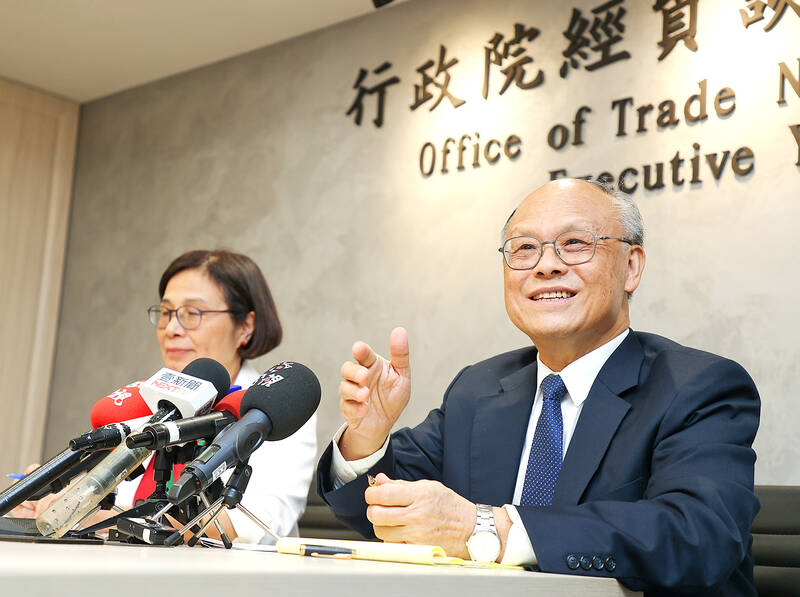Taiwanese and US representatives yesterday wrapped up the latest round of in-person trade talks in Taipei, but did not succeed in inking any agreements, Minister Without Portfolio and top negotiator John Deng (鄧振中) told a media briefing.
“The two sides gained better understanding of bilateral rules and differences on issues regarding labor rights protection, trading of agricultural products and environment protection,” Deng said.
The two sides needed more time to clarify details before working out a pact in line with the second phase of the US-Taiwan Initiative on 21st-Century Trade, Deng said.

Photo: CNA
Taiwan is seeking access to the US market for its mangoes and pineapples, as well as pork floss and sausage, Deng said.
There is a great need of new export destinations for these two fruits due to pressure from China, he said.
“Exports of agricultural products require complicated and longstanding negotiations… It took a decade for Taiwan’s guava to enter the US market,” he said.
Washington is pushing for relaxed regulations for its pork imports, an issue Taiwan prefers not to address until after the political transition on May 20 given its controversial nature, Deng said.
Taiwan’s mangoes and pineapples do not raise any food safety concerns, while Taiwanese are concerned about US pork products with ractopamine, the official said.
US negotiators believe Taiwan holds unnecessarily high standards regarding pork products, he said.
Labor protection dominates the trade talks and the two sides agree that flows of products made by forced labor must be stopped and they should be removed from shelves, Deng said.
The US is highly sensitive about products allegedly made by prisoners abroad.
Taiwan agrees with the US regarding the need to ban such products, but the nation would need more legal experts and inspectors to detect human rights violations, Deng said.
The US delegates consisted of more than 20 trade negotiators and observers from the US Congress, as the matter involves administrative and lawmaking processes, Deng said.
The two sides also reached an agreement on the importance of transparency and public participation in environmental protection so that public support can be gained for initiatives regarding the issue, Deng said.
In the past, such bilateral talks were held privately and caused public distrust or protests from civic groups, he said.
The five-day talks did not touch on the energy mix issue, but both sides agreed that they should make efforts to reduce carbon emissions, Deng said.
Washington is fully aware that there will be power transition in Taiwan later this month, but pressed ahead with the talks in part to show its respect and recognition of policy continuity, Deng said.
The two sides are to conduct more video conferences, he added.

A magnitude 7.0 earthquake struck off Yilan at 11:05pm yesterday, the Central Weather Administration (CWA) said. The epicenter was located at sea, about 32.3km east of Yilan County Hall, at a depth of 72.8km, CWA data showed There were no immediate reports of damage. The intensity of the quake, which gauges the actual effect of a seismic event, measured 4 in Yilan County area on Taiwan’s seven-tier intensity scale, the data showed. It measured 4 in other parts of eastern, northern and central Taiwan as well as Tainan, and 3 in Kaohsiung and Pingtung County, and 2 in Lienchiang and Penghu counties and 1

FOREIGN INTERFERENCE: Beijing would likely intensify public opinion warfare in next year’s local elections to prevent Lai from getting re-elected, the ‘Yomiuri Shimbun’ said Internal documents from a Chinese artificial intelligence (AI) company indicated that China has been using the technology to intervene in foreign elections, including propaganda targeting Taiwan’s local elections next year and presidential elections in 2028, a Japanese newspaper reported yesterday. The Institute of National Security of Vanderbilt University obtained nearly 400 pages of documents from GoLaxy, a company with ties to the Chinese government, and found evidence that it had apparently deployed sophisticated, AI-driven propaganda campaigns in Hong Kong and Taiwan to shape public opinion, the Yomiuri Shimbun reported. GoLaxy provides insights, situation analysis and public opinion-shaping technology by conducting network surveillance

‘POLITICAL GAME’: DPP lawmakers said the motion would not meet the legislative threshold needed, and accused the KMT and the TPP of trivializing the Constitution The Legislative Yuan yesterday approved a motion to initiate impeachment proceedings against President William Lai (賴清德), saying he had undermined Taiwan’s constitutional order and democracy. The motion was approved 61-50 by lawmakers from the main opposition Chinese Nationalist Party (KMT) and the smaller Taiwan People’s Party (TPP), who together hold a legislative majority. Under the motion, a roll call vote for impeachment would be held on May 19 next year, after various hearings are held and Lai is given the chance to defend himself. The move came after Lai on Monday last week did not promulgate an amendment passed by the legislature that

AFTERMATH: The Taipei City Government said it received 39 minor incident reports including gas leaks, water leaks and outages, and a damaged traffic signal A magnitude 7.0 earthquake struck off Taiwan’s northeastern coast late on Saturday, producing only two major aftershocks as of yesterday noon, the Central Weather Administration (CWA) said. The limited aftershocks contrast with last year’s major earthquake in Hualien County, as Saturday’s earthquake occurred at a greater depth in a subduction zone. Saturday’s earthquake struck at 11:05pm, with its hypocenter about 32.3km east of Yilan County Hall, at a depth of 72.8km. Shaking was felt in 17 administrative regions north of Tainan and in eastern Taiwan, reaching intensity level 4 on Taiwan’s seven-tier seismic scale, the CWA said. In Hualien, the